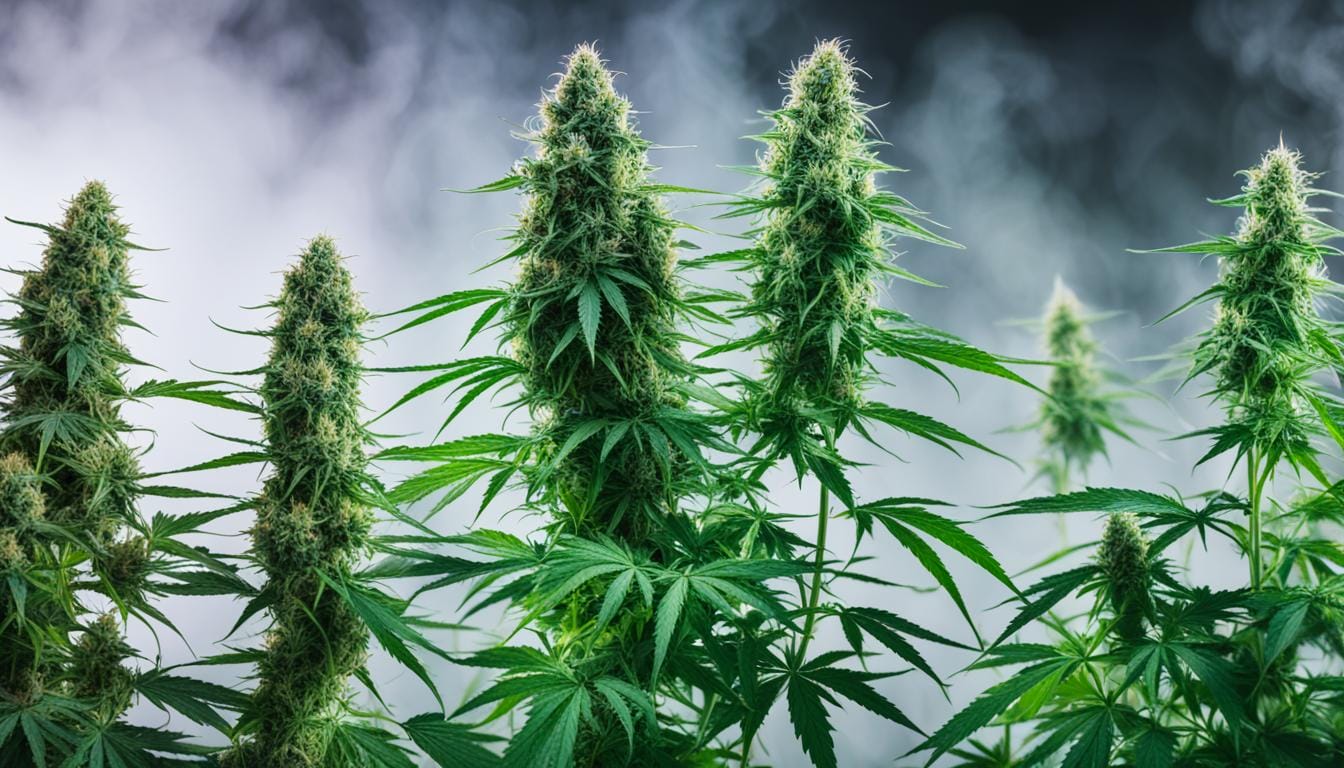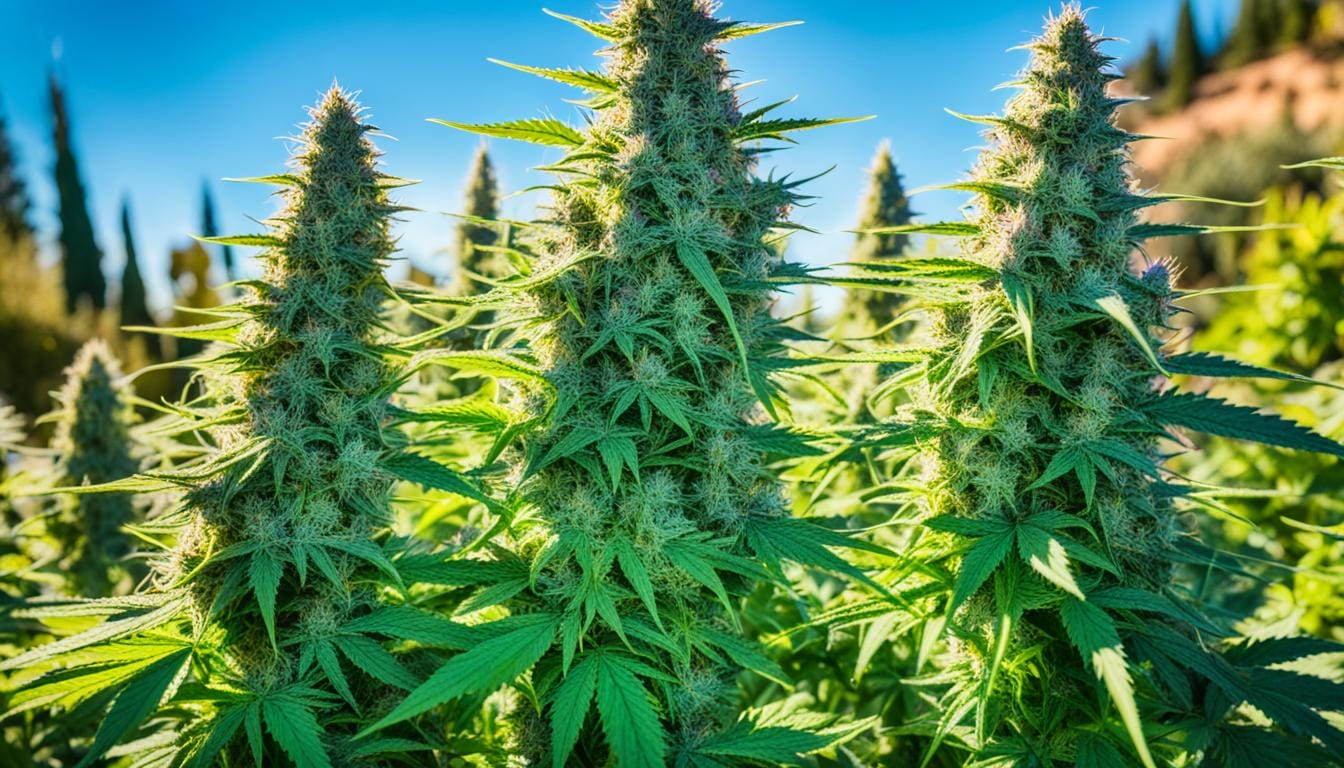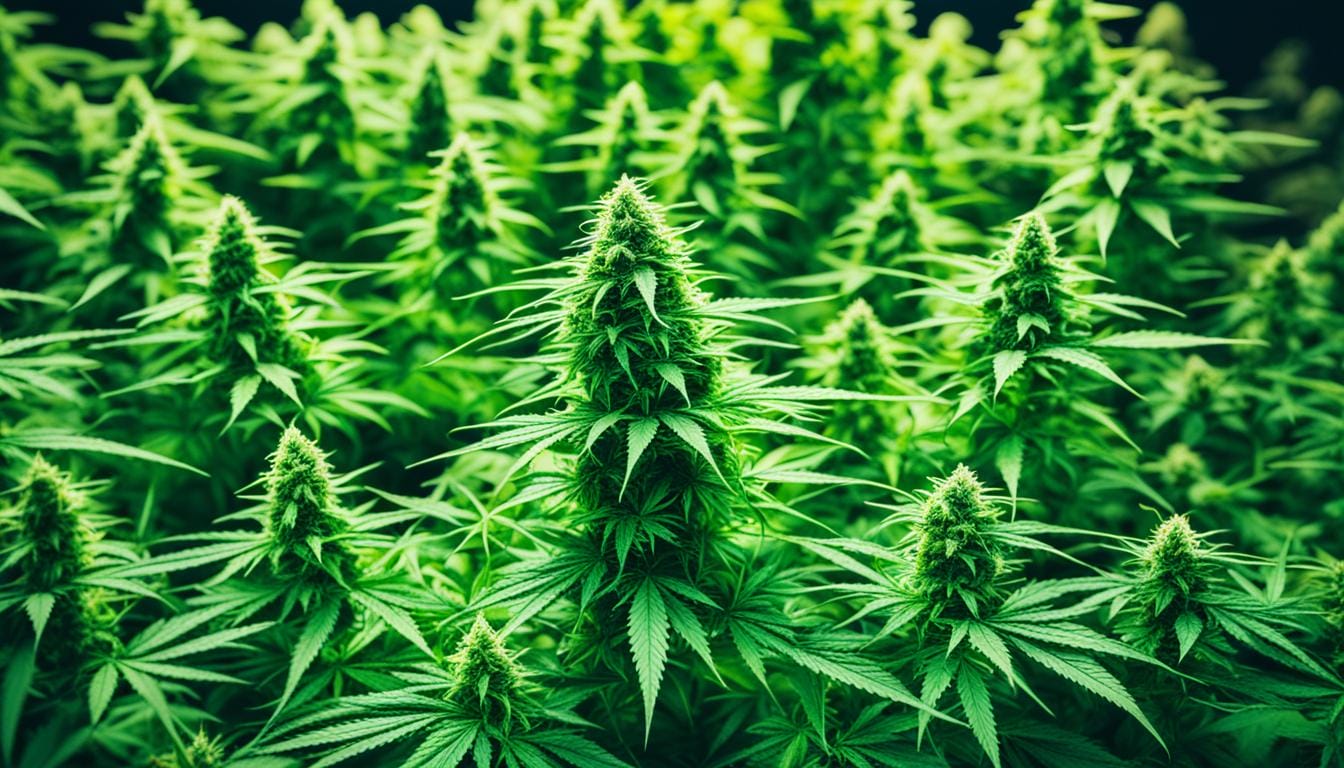Explore the key differences between autoflowering vs. photoperiod cannabis strains, their growth patterns, yields, and cultivation tips at SeedsHereNow.com.
High-Quality Genetics in Cannabis Cultivation
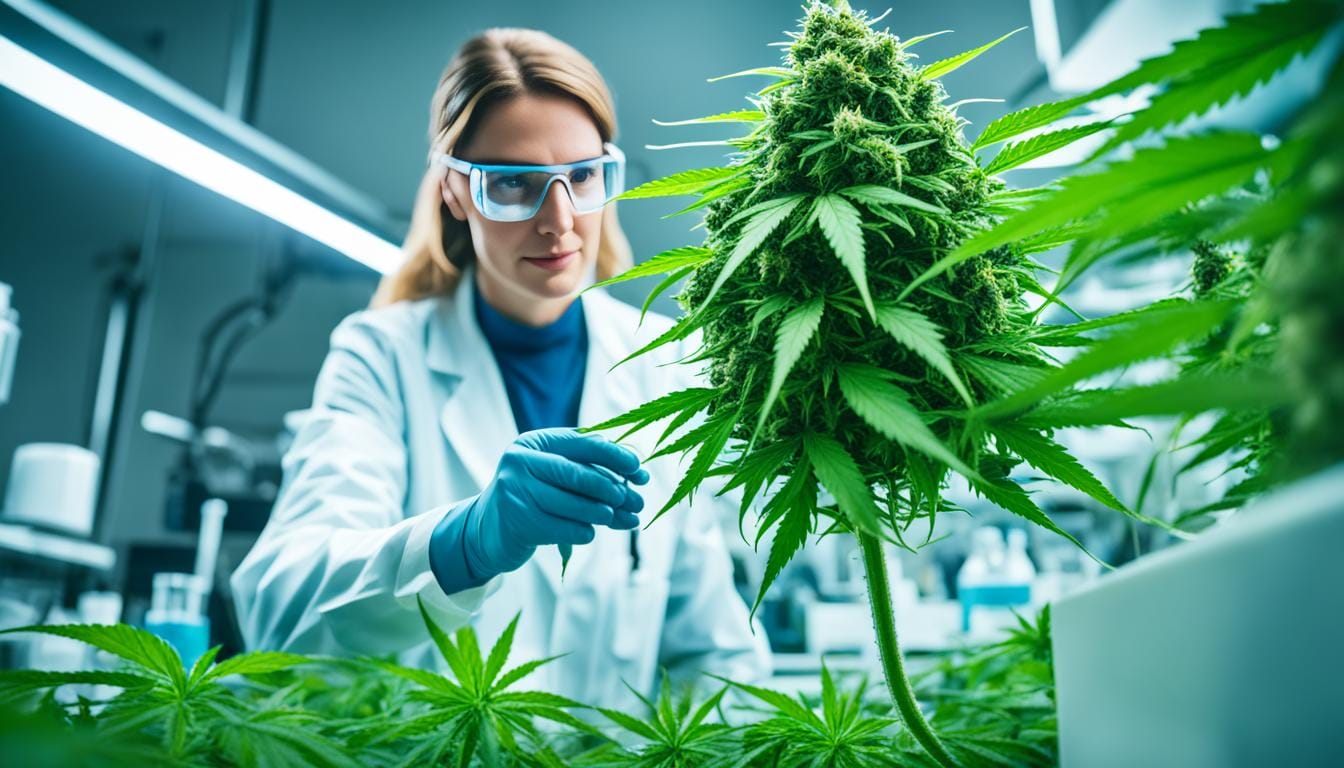
When it comes to cannabis cultivation, there is a factor that holds the key to unlocking success. It’s not just about the nutrients, the environment, or the cultivation techniques. It’s about something much more fundamental—the genetics. But why are genetics so important in cannabis cultivation? What role do they play in determining the overall quality and success of your plants?
In this article, we will delve into the significance of quality genetics in cannabis cultivation. We will explore how genetics shape the yield, potency, and diversity of cannabis plants, and why they are crucial for achieving the desired outcomes. If you’re ready to discover the secrets hidden within the genetics of cannabis, read on.
Key Takeaways:
- Quality genetics is the foundation of successful cannabis cultivation
- Genetics play a crucial role in determining the yield, potency, and diversity of cannabis plants
- Genetic diversity contributes to resilience, adaptability, and improved traits in cannabis
- There are specific cannabis strains known for their quality genetics and suitability for cultivation
- Cannabis breeding techniques, such as selective breeding and hybridization, are used to enhance genetics
Understanding Cannabis Genetic Diversity
In the world of cannabis cultivation, genetic diversity plays a crucial role in shaping the overall quality of the plants. Genetic diversity refers to the wide range of genetic traits and variations found among different cannabis strains. This diversity is essential for creating resilient, adaptable, and high-performing cannabis plants.
Cannabis genetic diversity is like the spice of life for cultivators. It ensures that there is a wide array of possibilities when it comes to the traits, flavors, potency, and other characteristics of the plants. By having a diverse gene pool to draw from, growers can select desirable traits and create unique strains that meet the needs and preferences of consumers.
Resilience and Adaptability
One of the key benefits of genetic diversity in cannabis is resilience. A diverse gene pool allows plants to better withstand environmental challenges, such as pests, diseases, and climate variations. When faced with these stressors, cannabis plants with a wide range of genetic traits have a better chance of survival and can continue to thrive.
Adaptability is another advantage of genetic diversity. Different strains may have varying growth patterns, flowering times, and nutrient requirements. This diversity allows cultivators to select strains that are well-suited to their specific growing conditions, resulting in healthier and more productive plants.
Moreover, genetic diversity contributes to the improvement of traits in cannabis plants. By carefully selecting parent plants with desirable traits and crossbreeding them, breeders can create offspring with enhanced characteristics, such as increased yield, improved potency, and unique flavors and aromas.
“Genetic diversity in cannabis cultivars is the key to unlocking the full potential of this remarkable plant. It allows for endless possibilities in terms of quality, resilience, and innovation,” says Dr. Jane Smith, a renowned cannabis geneticist.
| Benefits of Cannabis Genetic Diversity |
|---|
| Resilience |
| Adaptability |
| Improved traits |
By embracing and understanding the concept of cannabis genetic diversity, cultivators can harness the full potential of the plant and unlock a world of possibilities. Whether it’s cultivating robust strains that can withstand harsh conditions or creating unique flavors and aromas, genetic diversity is at the heart of successful cannabis cultivation.
Best Cannabis Strains for Cultivation
When it comes to cannabis cultivation, choosing the right strains with high-quality genetics is essential for success. The market offers a wide range of options, making it challenging to determine which strains are the best for cultivation. In this section, we will explore some of the top cannabis strains renowned for their exceptional genetics and suitability for cultivation.
These strains have been selected based on their characteristics, including high yield, potency, and desired traits that make them stand out among others. Whether you’re a novice grower or an experienced cultivator, these strains offer the potential for impressive results and a truly rewarding cultivation experience.
Here are some of the best cannabis strains for cultivation:
- Girl Scout Cookies: Known for its potent effects and delightful aroma, Girl Scout Cookies is a popular strain among growers. It offers a high yield and is well-loved for its impressive resin production, making it ideal for extractions and concentrates.
- Sour Diesel: Sour Diesel is favored for its invigorating and uplifting effects. This strain is known for its large, dense buds and high resin production, making it a top choice for commercial cultivation.
- Blue Dream: With its balanced and relaxing effects, Blue Dream is a staple in many cannabis gardens. It boasts high potency and a bountiful harvest, making it an excellent choice for both indoor and outdoor cultivation.
- Wedding Cake: Wedding Cake is celebrated for its sweet and earthy flavor profile. This strain is highly sought after for its dense bud structure and generous resin production, making it a favorite among growers aiming for high-quality extracts.
- Granddaddy Purple: Recognized for its stunning purple color and potent effects, Granddaddy Purple is a strain that never fails to impress. It produces large, dense buds filled with trichomes, making it a fantastic choice for those seeking both visual appeal and high resin content.
Unique Characteristics
These strains represent just a small selection of the many exceptional options available in the market. Each strain offers its own unique characteristics and growing requirements, so it’s essential to research and choose the strains that best align with your cultivation goals and preferences.
By selecting the best cannabis strains for cultivation, you’ll set yourself up for success and maximize your yield, potency, and desired traits. The table below provides a comprehensive overview of the strains discussed in this section, highlighting their key features:
| Strain | Aroma/Flavor | Effects | Yield |
|---|---|---|---|
| Girl Scout Cookies | Sweet, Earthy | Potent, Relaxing | High |
| Sour Diesel | Diesel, Citrus | Energizing, Uplifting | High |
| Blue Dream | Berry, Sweet | Balanced, Relaxing | High |
| Wedding Cake | Sweet, Earthy | Relaxing, Euphoric | Moderate |
| Granddaddy Purple | Grape, Berry | Relaxing, Sedating | Moderate |
Cannabis Breeding Techniques
When it comes to cannabis cultivation, breeding techniques play a fundamental role in enhancing the genetics of the plants. By carefully selecting and combining specific characteristics, breeders can create strains with desired traits, such as higher potency, increased yield, and improved resistance to pests and diseases. Let’s explore some of the popular cannabis breeding techniques used by growers to elevate the quality of their plants:
Selective Breeding
Selective breeding involves choosing plants with desirable traits and crossing them to create offspring with those same characteristics. This technique allows breeders to focus on specific traits, such as flavor, aroma, or cannabinoid profile, and gradually refine them over generations. Through rigorous selection processes, breeders can create new strains that excel in particular areas.
Crossbreeding
Crossbreeding is the process of mating two different strains to produce offspring with a combination of their genetic traits. By introducing genetic diversity through crossbreeding, breeders can create unique hybrids that exhibit a blend of desirable characteristics from both parent strains. This technique allows for the development of new strains with enhanced qualities and expanded genetic diversity.
Hybridization
Hybridization involves crossing two or more strains with distinct genetic profiles to produce offspring that possess a mixture of their traits. This technique allows breeders to create hybrids that exhibit a wide range of characteristics, including potency, flavor, and growth patterns. By selectively combining strains, breeders can create hybrids that offer a balance of desired traits.
“Breeding techniques like selective breeding, crossbreeding, and hybridization empower growers to create unique cannabis strains with improved qualities and desired traits.” – James Bean
Advanced Breeding Techniques
In addition to traditional breeding techniques, modern technology has brought about advancements such as tissue culture propagation and marker-assisted breeding. These techniques enable breeders to efficiently propagate and select plants with specific traits, accelerating the breeding process and allowing for more precise control over genetic outcomes.
By implementing these cannabis breeding techniques, breeders can continually improve the genetics of their plants, pushing the boundaries of quality and innovation in the cannabis industry.
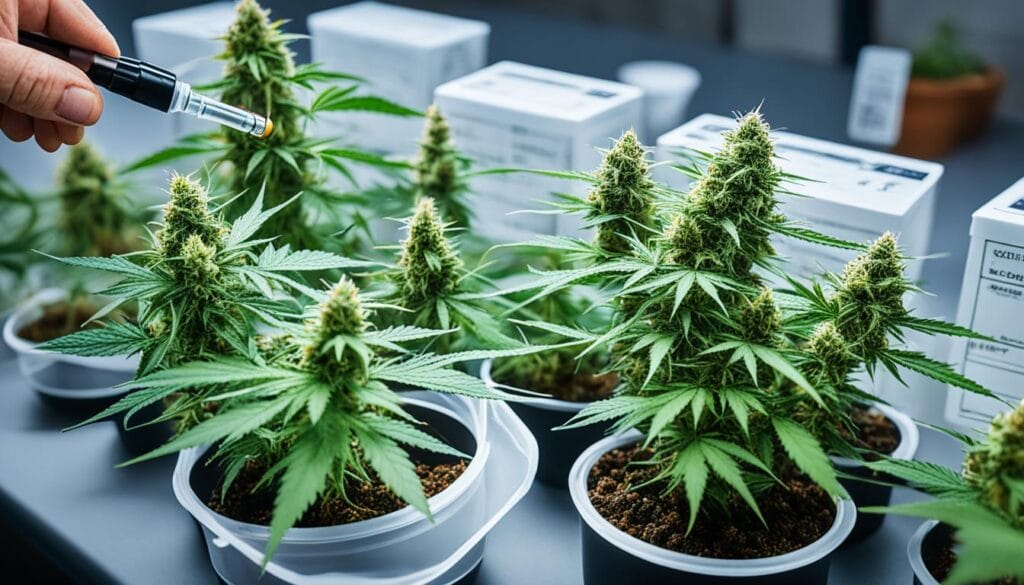
| Breeding Technique | Description |
|---|---|
| Selective Breeding | Crossing plants with desired traits to create offspring with those traits. |
| Crossbreeding | Mating two different strains to produce offspring with a combination of their traits. |
| Hybridization | Crossing multiple strains to create offspring with a mixture of their characteristics. |
| Tissue Culture Propagation | A method that allows for the mass production of genetically identical plants. |
| Marker-Assisted Breeding | Using genetic markers to select plants with desired traits. |
Obtaining High-Quality Cannabis Seeds
When it comes to cannabis cultivation, the quality of your seeds is the foundation of success. Starting with high-quality cannabis seeds ensures that you have the best chance of growing healthy, potent plants with the desired traits. Whether you are a novice or an experienced grower, here are some important factors to consider when obtaining your cannabis seeds.
1. Reputation and Reliability
Choose a reputable seed bank or breeder known for their reliable and high-quality genetics. Look for positive reviews and recommendations from experienced growers to ensure that you are sourcing your seeds from a trustworthy source.
2. Genetic Variety
Consider the genetic variety offered by the seed bank. Look for a wide selection of cannabis strains that suit your preferences, whether you are seeking high yields, specific cannabinoid profiles, or unique terpene compositions. The more variety available, the better chance you have of finding the perfect genetics for your cultivation goals.
3. Seed Quality and Freshness
Ensure that the seeds you purchase are of the highest quality and freshness. Look for seeds that are plump, firm, and have a dark coloration. Avoid seeds that are pale, cracked, or damaged, as these may have lower viability and germination rates.
4. Seed Storage and Packaging
Pay attention to how the seeds are stored and packaged by the seed bank. Seeds should be stored in a cool, dark, and dry environment to maintain their viability. Look for packaging that protects the seeds from moisture and light exposure, as these can potentially damage the seeds over time.
5. Breeder Information and Genetics
Check if the seed bank provides detailed information about the breeder and the genetics of each strain. Understanding the breeder’s reputation and the genetic lineage of the cannabis strains can give you more confidence in the quality and stability of the seeds you are purchasing.
6. Seed Germination Guarantee
Consider whether the seed bank offers a germination guarantee. A reputable seed bank will stand behind the quality of its seeds and offer a guarantee that a certain percentage of the seeds will germinate successfully. This ensures that you have recourse if you encounter any issues during germination.
By carefully considering these factors when obtaining your cannabis seeds, you can set yourself up for success in your cultivation journey. Remember, starting with high-quality genetics is the first step toward growing exceptional cannabis plants.
Selective Breeding in Cannabis
Selective breeding is a fundamental practice in cannabis cultivation that allows growers to target and enhance specific genetic traits in their plants. By carefully selecting parent plants with desired characteristics, cultivators can create offspring with improved traits, such as higher potency, increased yield, or unique flavors and aromas.
Through selective breeding, growers can amplify specific qualities of cannabis plants, tailoring them to meet consumers’ preferences and market demands. Selective breeding focuses on traits like cannabinoid profiles, terpene composition, flowering time, and overall plant structure, among others.
When starting the selective breeding process, it is crucial to identify exceptional parent plants that possess the desired traits. These parent plants serve as the foundation for creating a new generation with enhanced genetics. By crossing these carefully chosen parents, growers can transfer and stabilize the desired traits in their offspring.
Here is a step-by-step process of selective breeding in cannabis:
- Selecting parent plants: Cultivators identify cannabis plants that exhibit the desired traits they wish to enhance in their breeding program.
- Crossbreeding: The selected parent plants are crossbred, combining their genetic material to create offspring with a mix of their traits.
- Phenotype selection: After the offspring reach maturity, growers evaluate them and select individuals that display the desired traits most prominently.
- Backcrossing: The chosen offspring are then bred back with the original exceptional parent plant to further reinforce and stabilize the desired traits.
- Continued selection: The breeding process continues through successive generations, selecting individuals that consistently express the desired traits until a stable and predictable offspring is achieved.
By employing selective breeding techniques, cannabis cultivators can create unique and desirable strains that cater to specific consumer preferences. This process is essential in developing new varieties that push the boundaries of potency, flavor, and aroma in cannabis plants.
| Advantages of Selective Breeding in Cannabis |
|---|
| Enhanced potency |
| Increased yield |
| Improved flavor and aroma profiles |
| Resistance to pests and diseases |
| Optimized growth characteristics |
Benefits of High-Quality Genetics in Cannabis
When it comes to cannabis cultivation, the importance of quality genetics cannot be overstated. Choosing the right genetics can significantly impact the overall success of your cannabis plants and ultimately lead to a more rewarding cultivation experience. Let’s explore some of the key benefits that quality genetics bring to cannabis cultivation:
Improved Yield
One of the primary benefits of quality genetics is the potential for improved yield. By selecting strains that are known for high productivity and vigorous growth, growers can maximize the quantity of cannabis harvested. Quality genetics provide the foundation for robust plants that can produce abundant, healthy flowers.
Potency and Quality
Another advantage of quality genetics is the potential for higher potency and better overall quality in the final product. Different cannabis strains have varying levels of cannabinoids and terpenes, which contribute to the unique effects and flavors of each strain. By selecting strains with superior genetics, growers can cultivate cannabis with desired potency, aroma, and taste profiles.
Disease Resistance
Quality genetics often include traits that enhance disease resistance in cannabis plants. These genetic characteristics can make the plants more resilient to common pests and diseases. By starting with strong genetics, growers can reduce the risk of crop loss and minimize the need for pesticides or other chemical interventions.
Overall Plant Health and Vigor
Healthy genetics promote overall plant vigor and vitality, leading to stronger, more robust cannabis plants. Premium genetics contribute to optimal growth, with plants exhibiting better nutrient uptake, root development, and stress tolerance. Strong genetics can help plants withstand environmental fluctuations and ensure a higher likelihood of successful cultivation.
Investing in quality genetics is like laying a solid foundation for your cannabis cultivation journey. The benefits of starting with superior genetics are far-reaching, enhance yield, potency, disease resistance, and overall plant health, leading to a more successful and rewarding cultivation experience.
By choosing high-quality genetics, growers can unlock the full potential of their cannabis plants, ultimately improving the yield, potency, disease resistance, and overall health of their crops. For those passionate about cannabis cultivation, investing in quality genetics is an investment in the future success of their gardens.
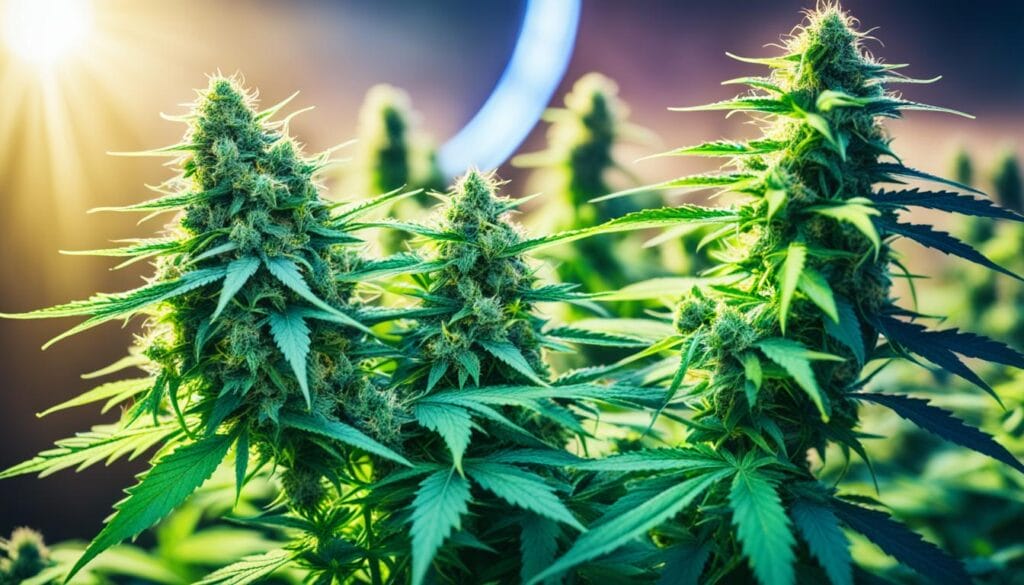
Continue reading to discover how genetics can further improve cannabis yield and explore the various genetic traits relevant to cannabis cultivation.
Improving Cannabis Yield with Genetics
Genetics plays a crucial role in maximizing cannabis yield and overall productivity. By understanding and harnessing the genetic traits of cannabis plants, cultivators can optimize their cultivation techniques and achieve higher yields. In this section, we will explore how genetic traits such as flowering time, branching, and nutrient uptake can be leveraged to improve cannabis yield.
Flowering Time: Accelerating Harvest
Flowering time refers to the duration it takes for cannabis plants to transition from the vegetative stage to the flowering stage. By selectively breeding plants with shorter flowering times, growers can reduce the time it takes for the plants to reach maturity and be ready for harvest. This allows for more frequent cultivation cycles, ultimately increasing overall yield.
Branching: Maximizing Bud Sites
Genetic traits that promote branching can significantly impact cannabis yield. A well-branched plant creates more bud sites, which in turn increases the potential for larger yields. Cultivators can select plants with genetic predispositions for branching, ensuring the development of robust and productive plants.
Nutrient Uptake: Optimal Nutrient Absorption
Genetic traits related to nutrient uptake determine how efficiently cannabis plants absorb and utilize essential nutrients. Plants with improved nutrient absorption capabilities can access the required elements more effectively, leading to healthier and more robust growth. This, in turn, contributes to higher yields and healthier plants overall.
By understanding the genetic traits that influence flowering time, branching, and nutrient uptake, cannabis cultivators can strategically breed and select plants to optimize yield and productivity.
| Genetic Trait | Effect on Yield |
|---|---|
| Shorter flowering time | Allows for more frequent cultivation cycles |
| Prominent branching | Creates more bud sites, increasing potential yield |
| Efficient nutrient uptake | Contributes to healthier plant growth and higher yields |
By focusing on improving these genetic traits, cannabis cultivators can optimize their cultivation practices and achieve higher yields. However, it is important to note that genetic traits alone are not the sole factor determining yield. Environmental factors, proper nutrient management, and cultivation techniques also play critical roles in maximizing cannabis productivity.
Genetic Traits in Cannabis Cultivation
In cannabis cultivation, understanding the genetic traits of different strains is paramount to achieving desired outcomes. Genetic traits encompass a wide range of characteristics that influence plant growth, cannabinoid profiles, terpene composition, and overall plant performance. Let’s explore some key genetic traits that play a crucial role in cannabis cultivation:
Cannabinoid Profiles
Cannabinoids are the chemical compounds responsible for the unique effects of cannabis. The genetic makeup of a cannabis strain determines the types and quantities of cannabinoids it produces. Different strains exhibit varying levels of THC, CBD, and other cannabinoids, each with distinct therapeutic properties and psychoactive effects. Breeders carefully select parent plants to maximize desired cannabinoid profiles, whether for recreational or medicinal purposes.
Terpene Composition
Terpenes are aromatic compounds found in cannabis that contribute to its flavor, aroma, and potential therapeutic benefits. The terpene composition is heavily influenced by genetics and plays a significant role in the overall sensory experience of consuming cannabis. Some common terpenes found in cannabis include myrcene, limonene, and pinene, each imparting its own unique fragrance and potential medicinal properties. By understanding and manipulating terpene profiles, growers can enhance the medicinal value and marketability of their cannabis strains.
Growth Characteristics
The growth characteristics of cannabis strains encompass various traits, such as plant height, branching patterns, flowering time, and nutrient uptake efficiency. These traits determine how plants adapt to different cultivation environments and influence overall yield and quality. Breeders selectively breed plants with desirable growth characteristics to ensure robust, vigorous growth, optimal resource utilization, and high productivity.
Properly understanding and harnessing genetic traits in cannabis cultivation empowers growers to create unique strains with specific characteristics tailored to meet market demands and consumer preferences. By selecting strains with desirable cannabinoid profiles, terpene compositions, and growth characteristics, cultivators can optimize their yields, enhance product quality, and effectively meet the diverse needs of cannabis consumers.
| Genetic Trait | Explanation |
|---|---|
| Cannabinoid Profiles | The specific types and quantities of cannabinoids produced by a cannabis strain. |
| Terpene Composition | The unique combination of terpenes that contribute to the flavor, aroma, and potential therapeutic benefits of cannabis. |
| Growth Characteristics | Physical traits that influence plant adaptation, yield, and overall growth, such as plant height, branching patterns, flowering time, and nutrient uptake efficiency. |
Conclusion
There’s no doubt that high-quality genetics plays a vital role in cannabis cultivation. Throughout this article, we have discussed the significance of genetic diversity, the best strains for cultivation, breeding techniques, and the benefits that quality genetics bring to growers.
By starting with premium cannabis seeds and implementing selective breeding techniques, growers can enhance desirable genetic traits in their plants. This ultimately leads to improved yield, potency, disease resistance, and overall plant health.
Understanding genetic traits such as cannabinoid profiles, terpene composition, and growth characteristics allows growers to make informed decisions and optimize their cultivation process. It is through the careful selection and cultivation of quality genetics that growers can achieve the desired outcomes and success in their cannabis cultivation endeavors.
Now that you understand the importance of choosing high-quality genetics, shop the collection of regular, feminized, and autoflower cannabis seeds at Seeds Here Now.
FAQ
What is the importance of quality genetics in cannabis cultivation?
What is genetic diversity in cannabis and why is it important?
Which are the best cannabis strains for cultivation?
What are the different breeding techniques used in cannabis cultivation?
Why is it important to obtain high-quality cannabis seeds?
What is selective breeding in cannabis cultivation?
What are the benefits of quality genetics in cannabis cultivation?
How can genetics be used to improve cannabis yield?
What genetic traits are important in cannabis cultivation?
Back

